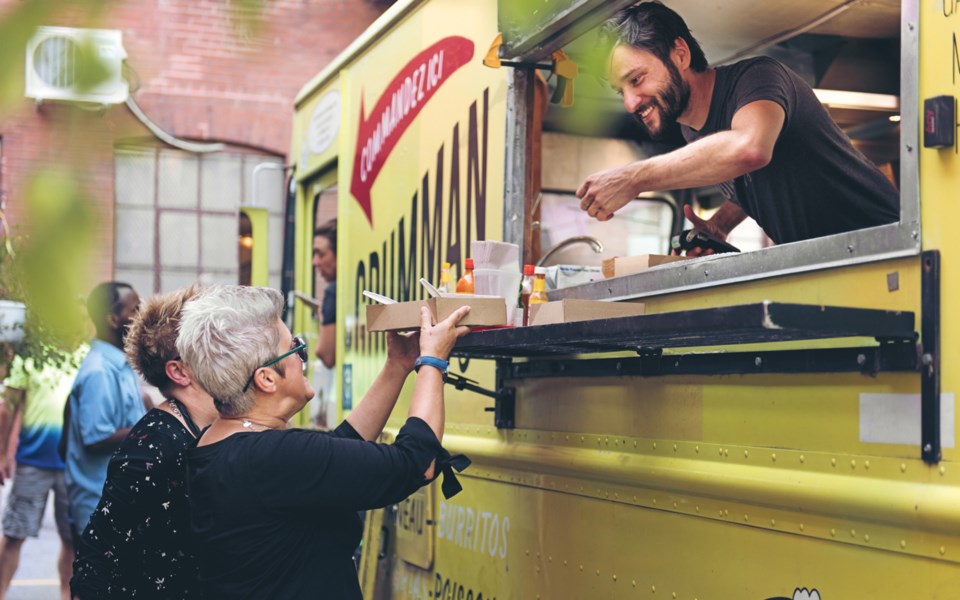Village of Pemberton (VOP) officials greenlit a pilot project this week that will welcome mobile food vendors to the community, starting this summer.
At a virtual council meeting on Tuesday, May 11, Pemberton council approved a revised version of the mobile vendor program that was first presented to officials at a Committee of the Whole meeting last month. The amendments extend the original one-year pilot through the summer of 2022, and gives preference to local vendors, vendors proposing healthy food options and vendors sourcing ingredients locally.
“The pilot program is intended to be a learning process for the Village and for vendors, with changes expected to be made to the policy after the first season,” said VOP legislative assistant Gwendolyn Kennedy.
The vending season runs from June 11 to September, with this year’s application deadline set for May 28.
Applicants will be considered using an 100-point scoring system, with bonus points given to operators residing in Pemberton or the Squamish Lillooet-Regional District Area C, as the VOP cannot legally prohibit business owners from outside the community from taking part. The Pemberton Chamber of Commerce and the Pemberton Area Economic Development Collaborative will be also notified of the program so they can help get the word out.
Food vendors will have the opportunity to apply for their preferred locations and dates, with a random draw deciding in the event certain days, or locations, are requested by more than one operator. The objective, the VOP said, is for vendors to cycle through the different locations throughout the summer to maximize variety for customers and ensure that vendors have fair access to desirable venues.
The approved locations are: the One Mile Lake lower parking lot; the Industrial Park; the Pemberton Community Centre parking lot; the Den Duyf Park, and the Downtown Community Barn, however, the latter will only be available on Friday nights coinciding with the local farmers’ market after an amendment from the council table.
“I would have some concerns if we open it up other than for the farmers’ market, for the simple reason that The Pony is setting [a food truck] up, about a block away, and that area downtown is also where the majority of our cafés, bakeries, coffee shops, etc. are located,” noted acting mayor Ted Craddock.
In June 2020, VOP council approved a three-year permit for The Pony to operate a food truck in a vacant lot on Portage Road. (Mayor Mike Richman recused himself from the discussions as a co-owner of Town Square Restaurant.)
Successful applicants will be granted a mobile food vendor permit valid for the applicable season of the pilot program, with approved 2021 operators required to submit a new application for the 2022 season if they wish to participate. A business licence is also required in addition to the mobile vendor permit.
Along with adding animation to the community, the VOP sees the program as a way to help counter some of the losses suffered by a restaurant industry that has been particularly hard hit by the pandemic.
“Mobile food carts can provide a viable expansion for an existing restaurant or café, allowing them to access markets not available to brick-and-mortar locations during the pandemic,” read an April 27 report to council.
Council signs on to Good Food Program
In other Spud Valley culinary news, Pemberton council on Tuesday voted to endorse an initiative that aims to advance the sustainability of the region’s food system.
Launched in 2018 by the Squamish Lillooet Regional Food Task Force, the Good Food Program looks to support local food producers and processors through the implementation of food procurement practices aligned with “good food” values.
The pledge asks participating local governments to purchase directly from local farms and producers when possible; to establish supply-chain accountability with vendors and distributors; and to work towards implementing good food values in its procurement and purchasing practices.
While the Good Food Program is still in development, organizers are asking local governments and organizations to sign onto its pledge and policy before it is finalized.




